Charles E W Bean, Diaries, AWM38 3DRL 606/86/1 - August 1917 - Part 5
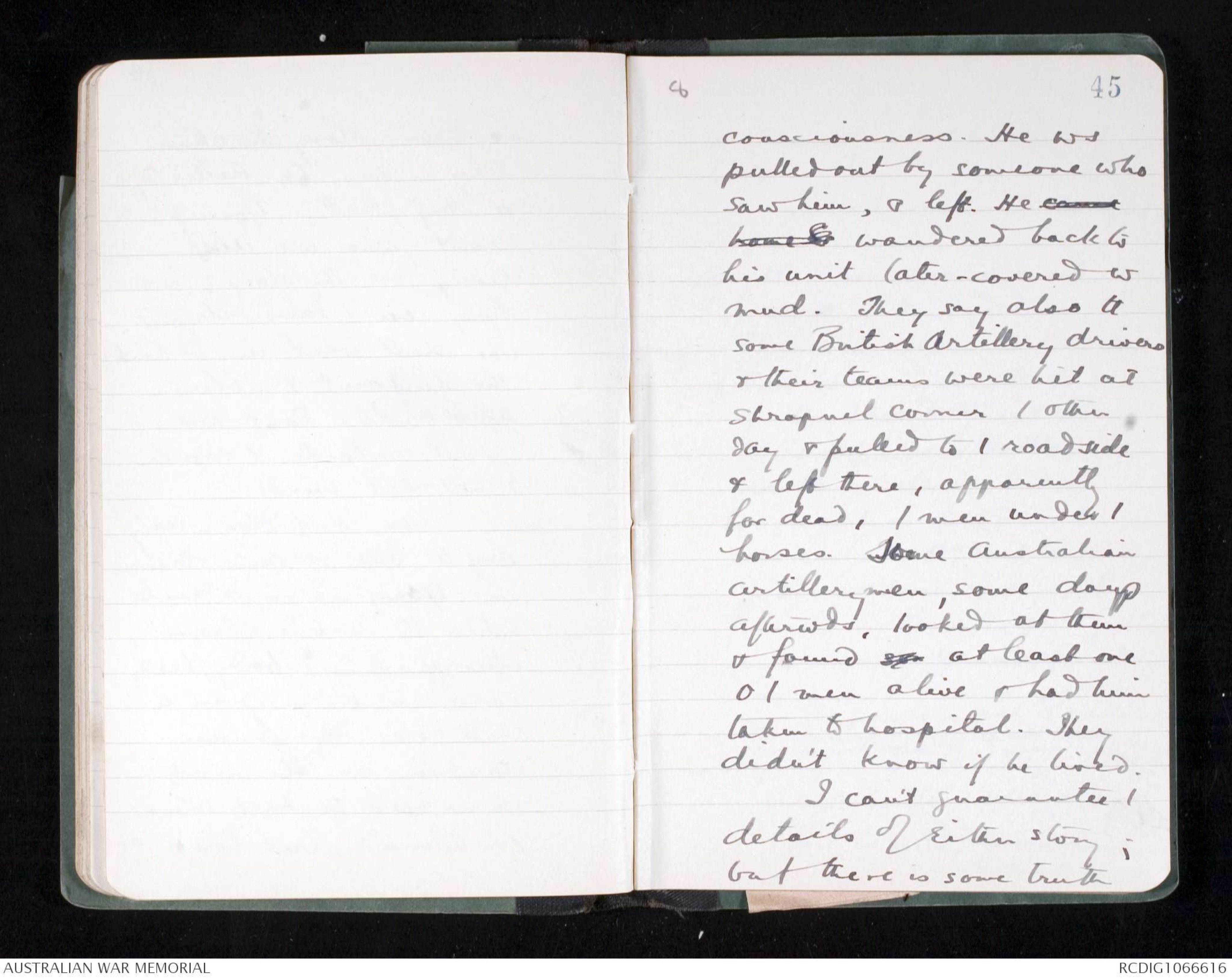
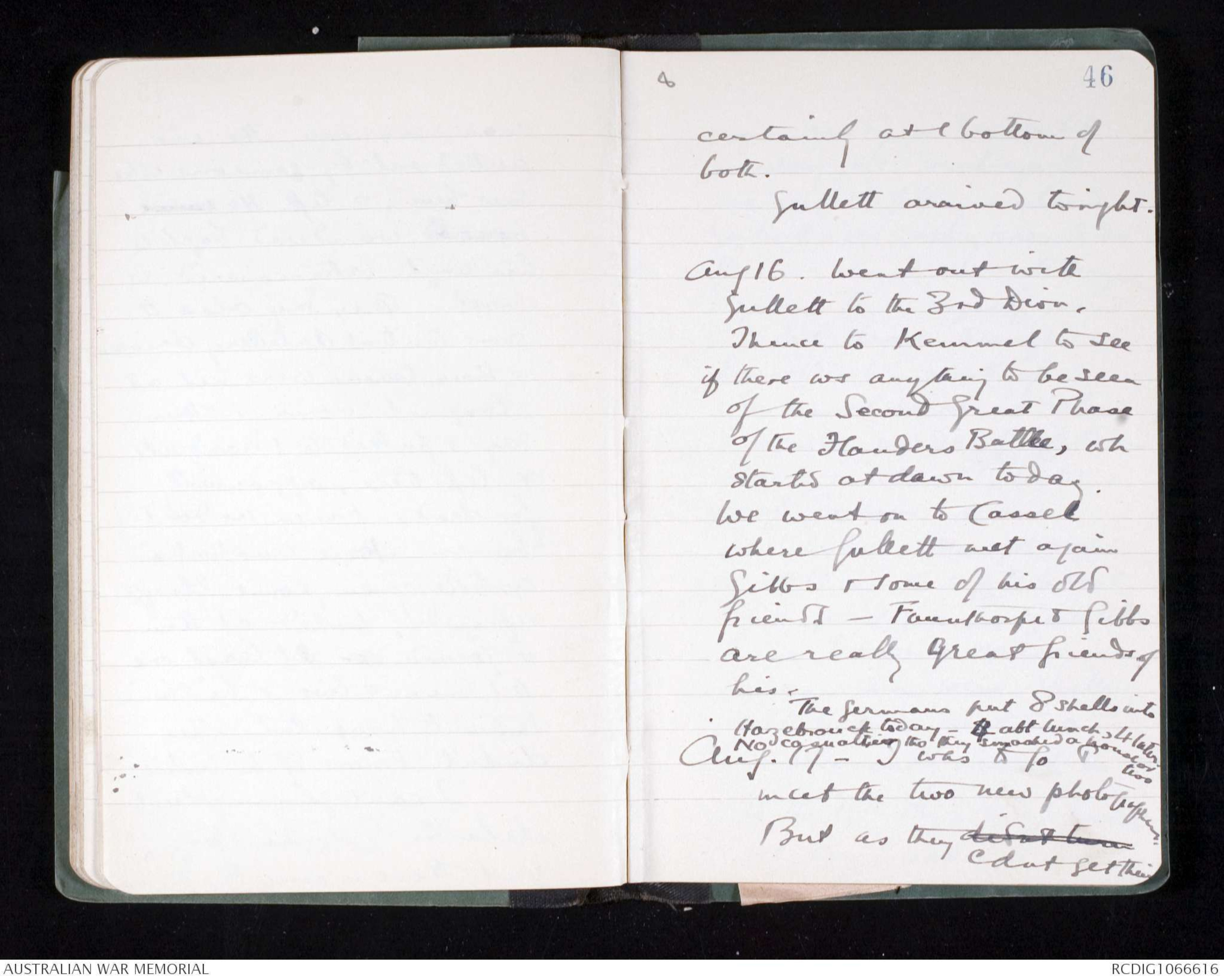
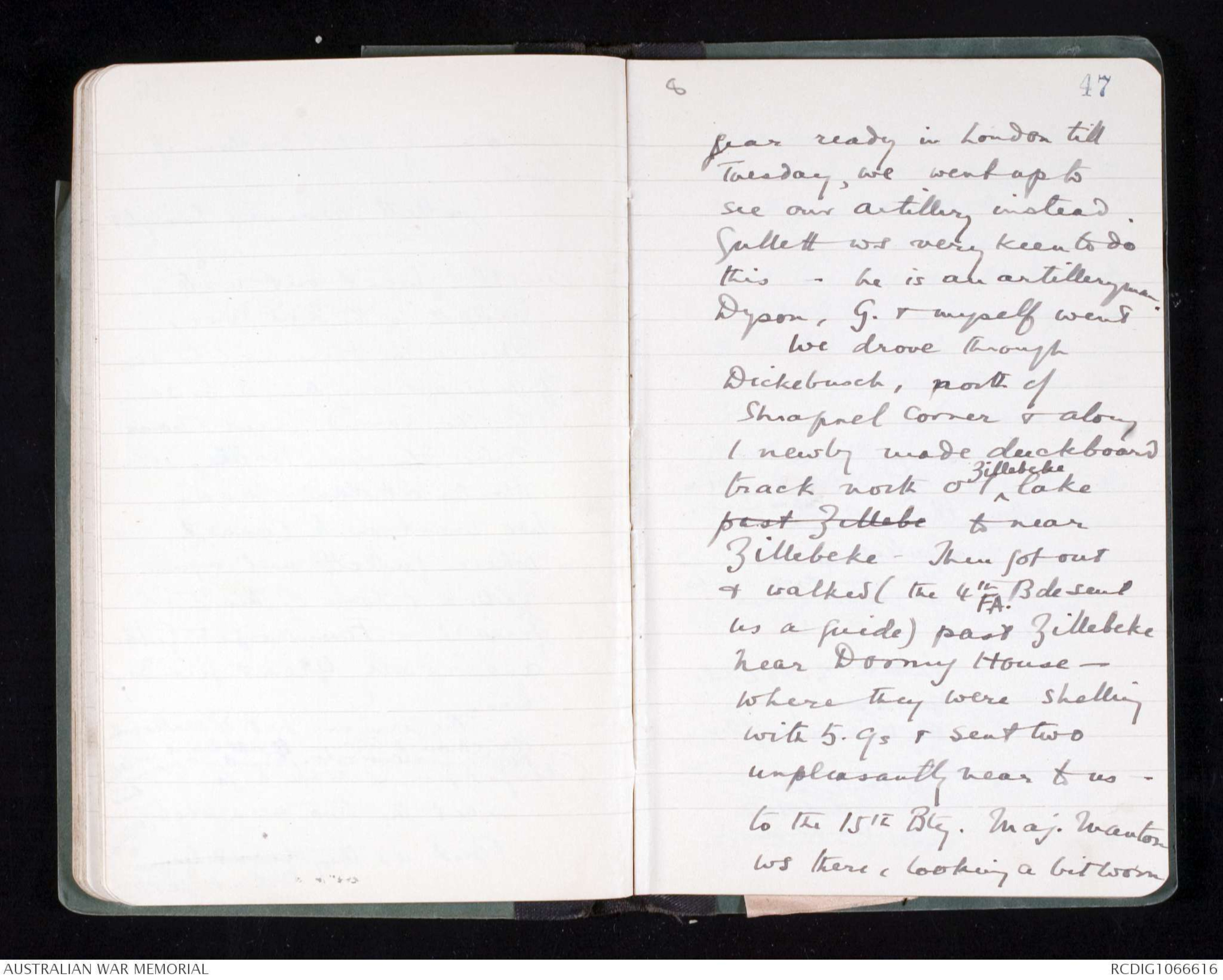
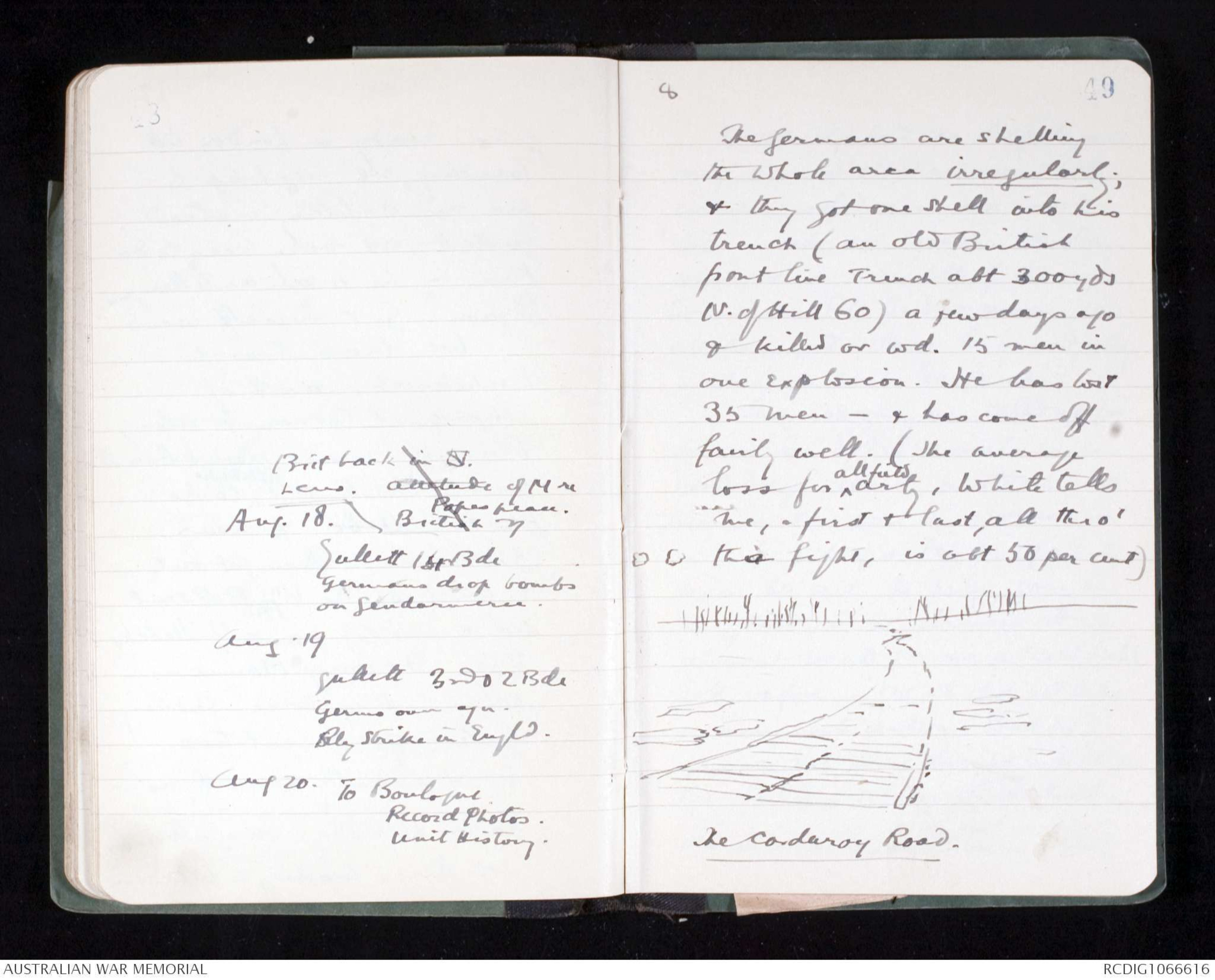
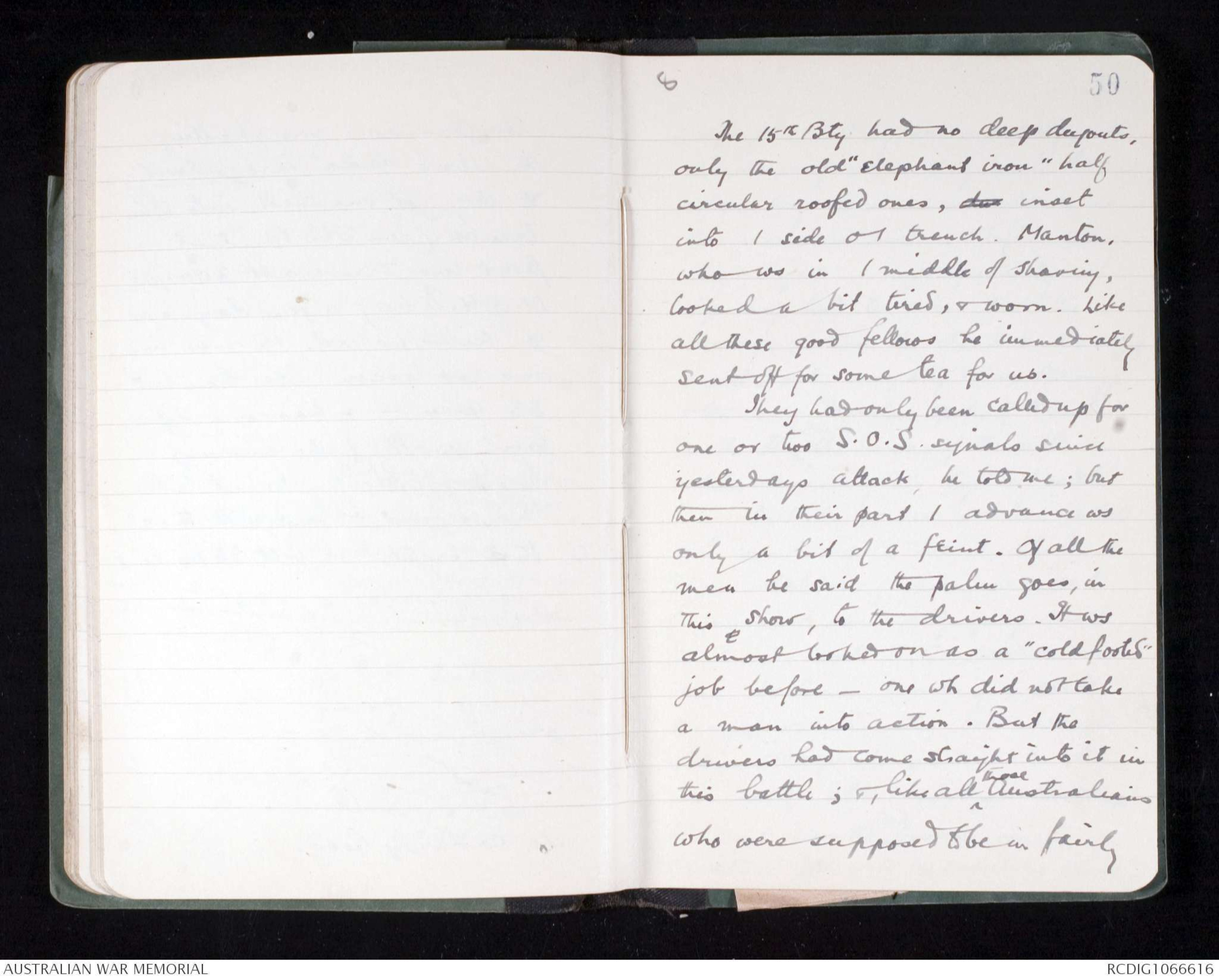
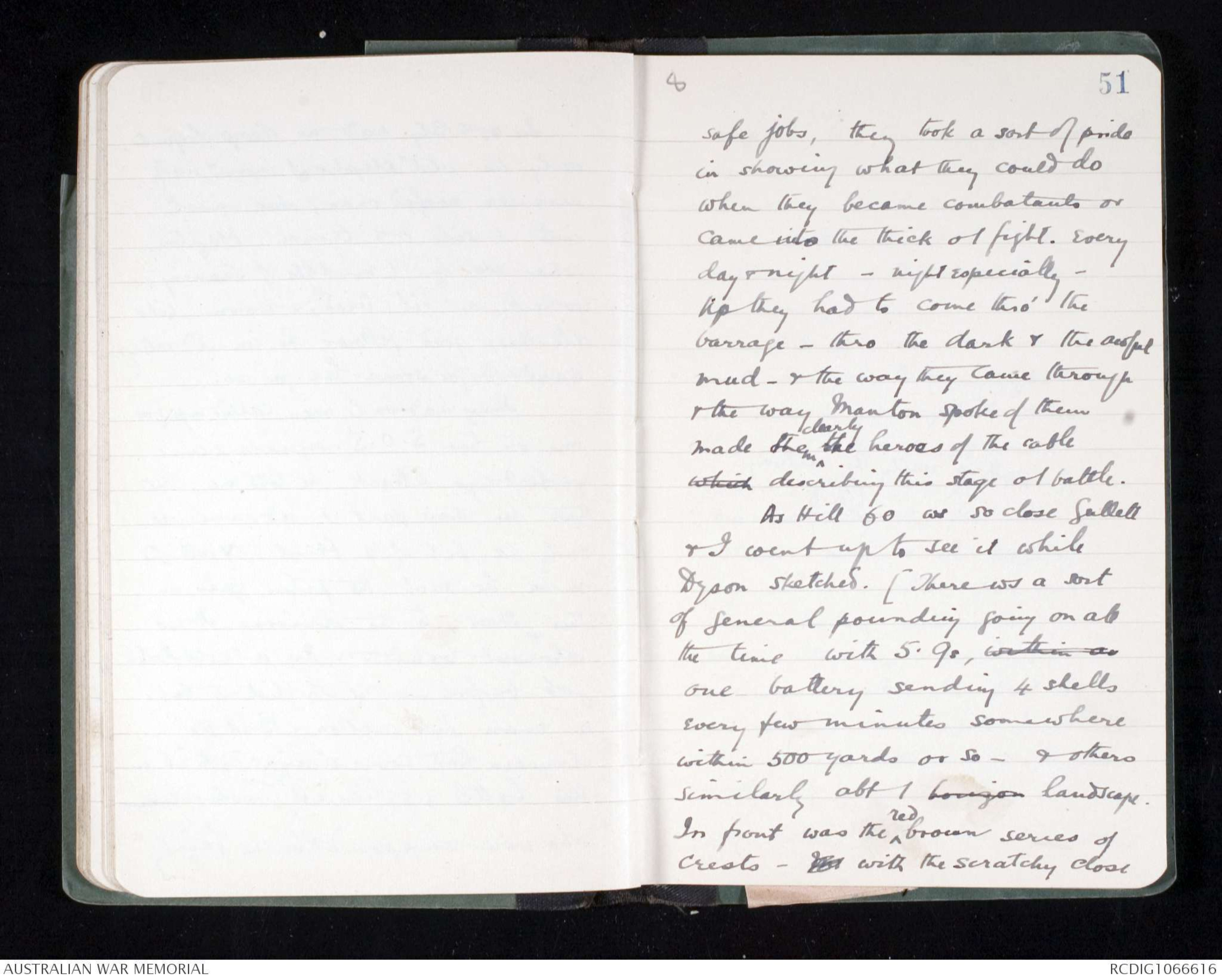
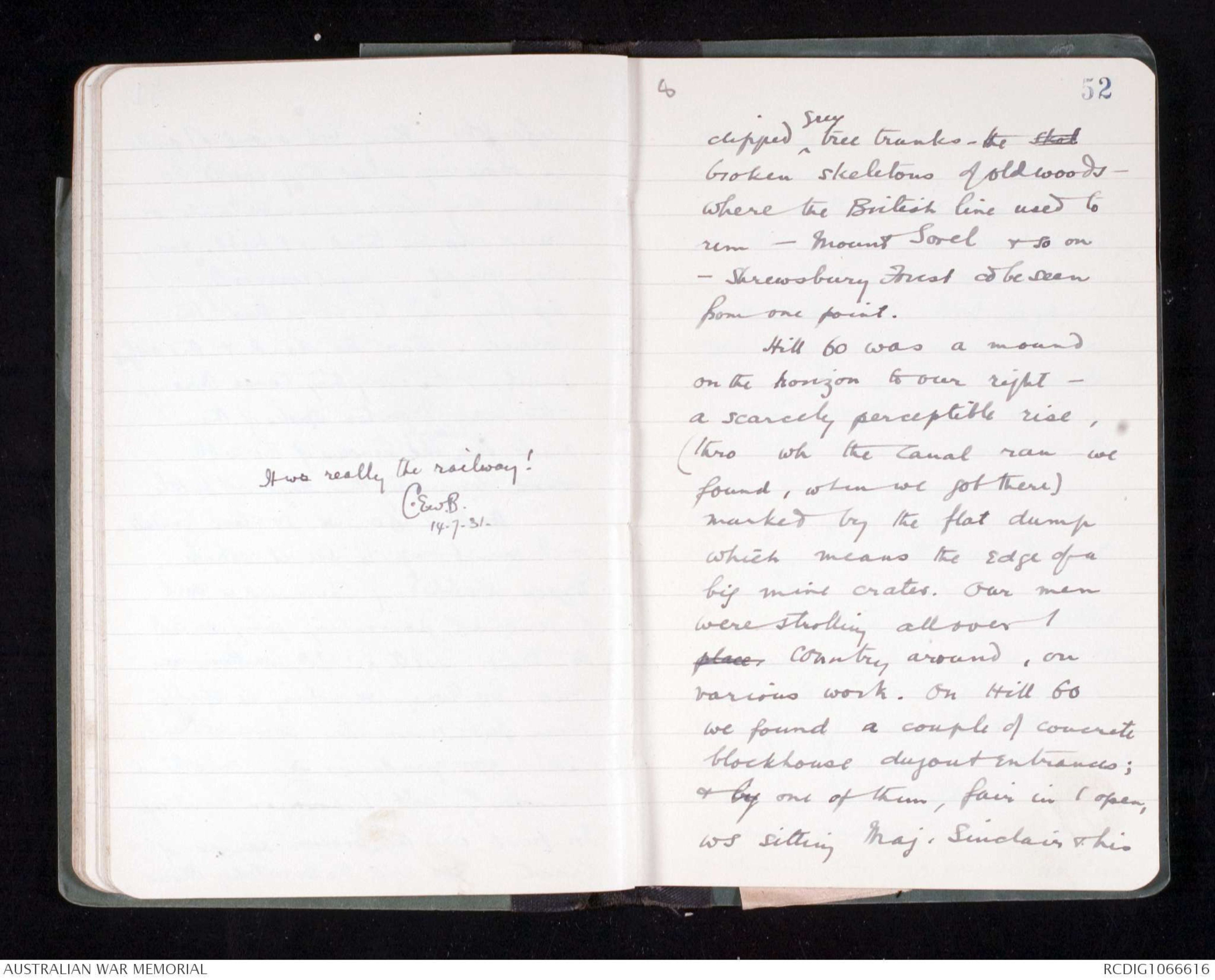
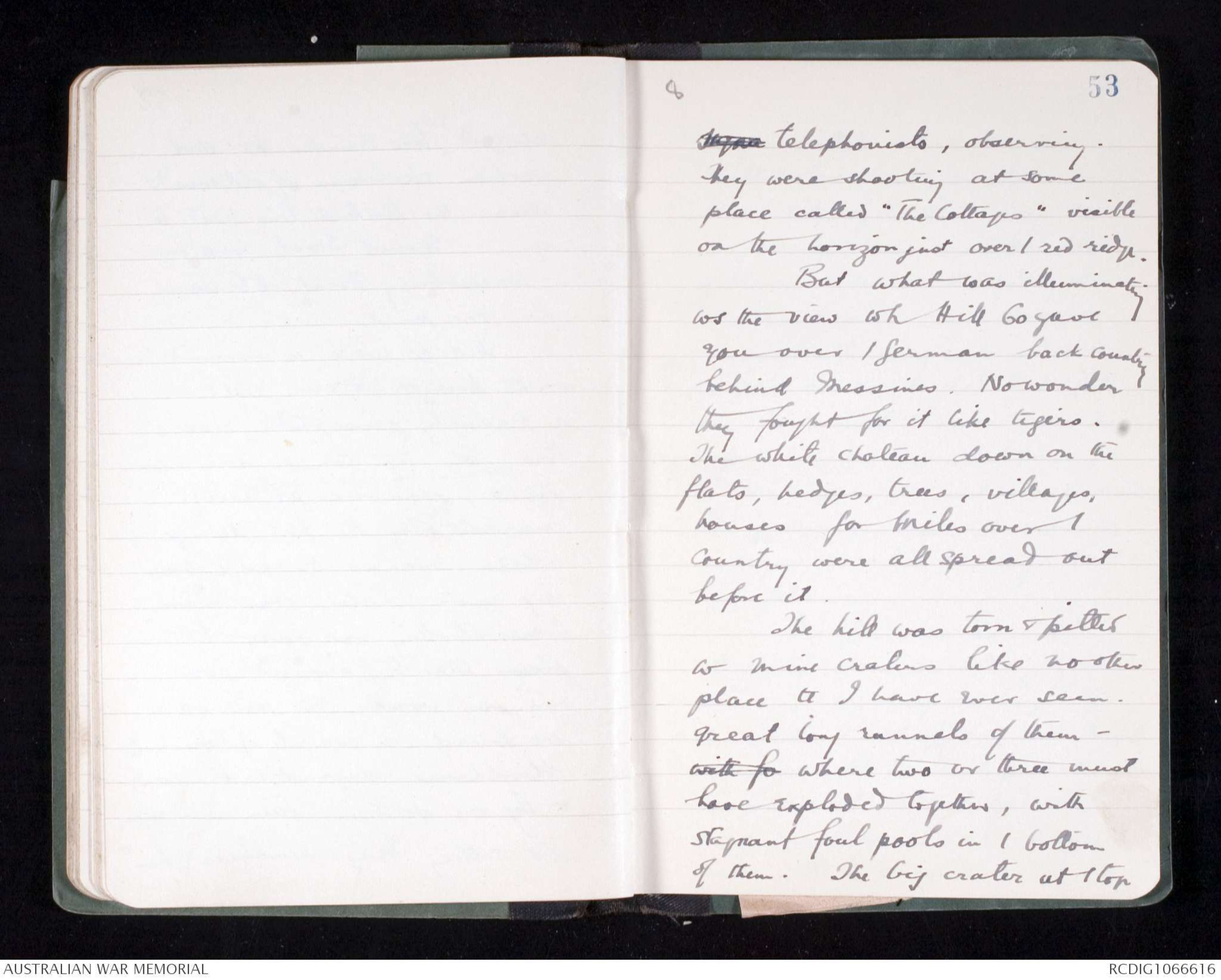
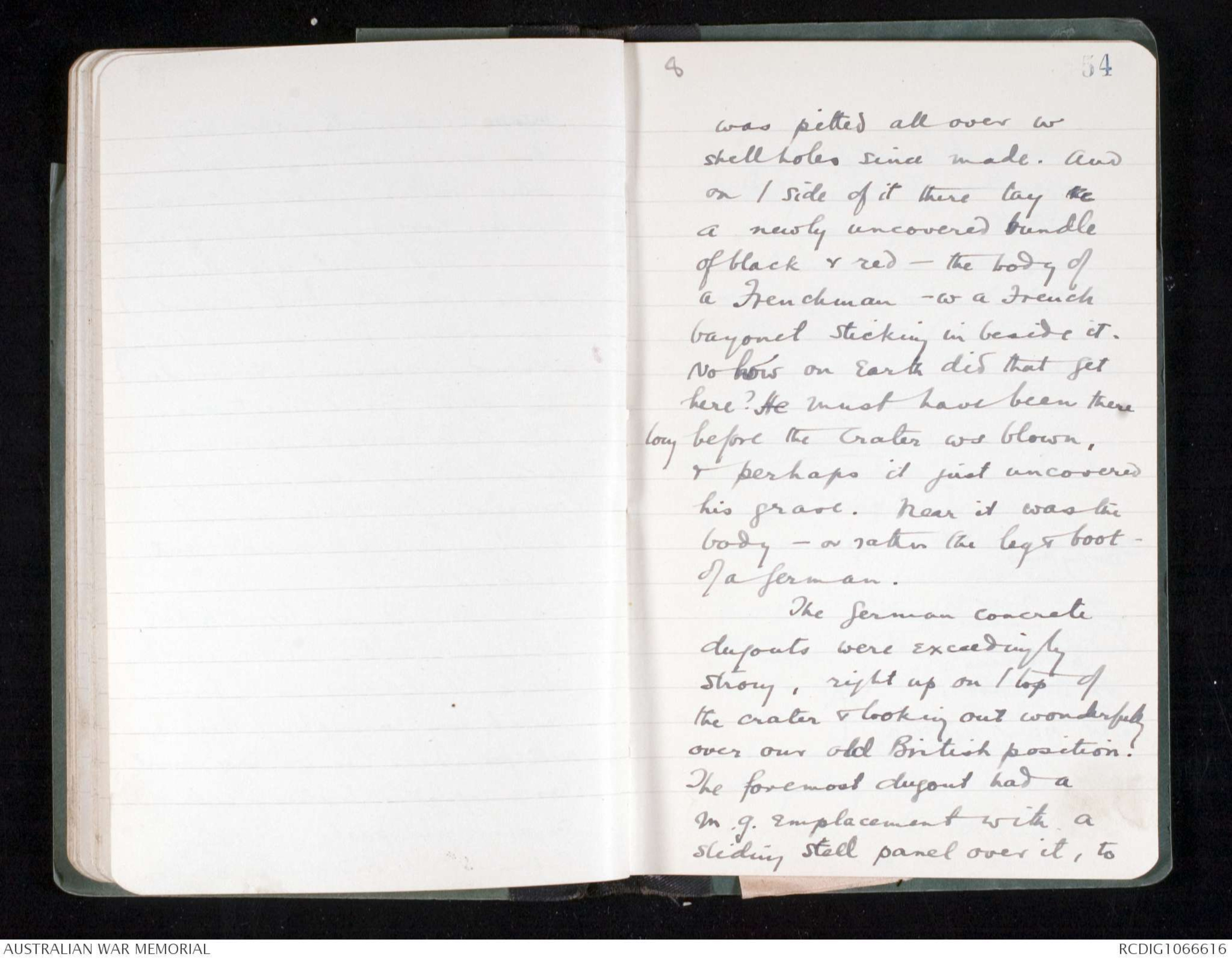
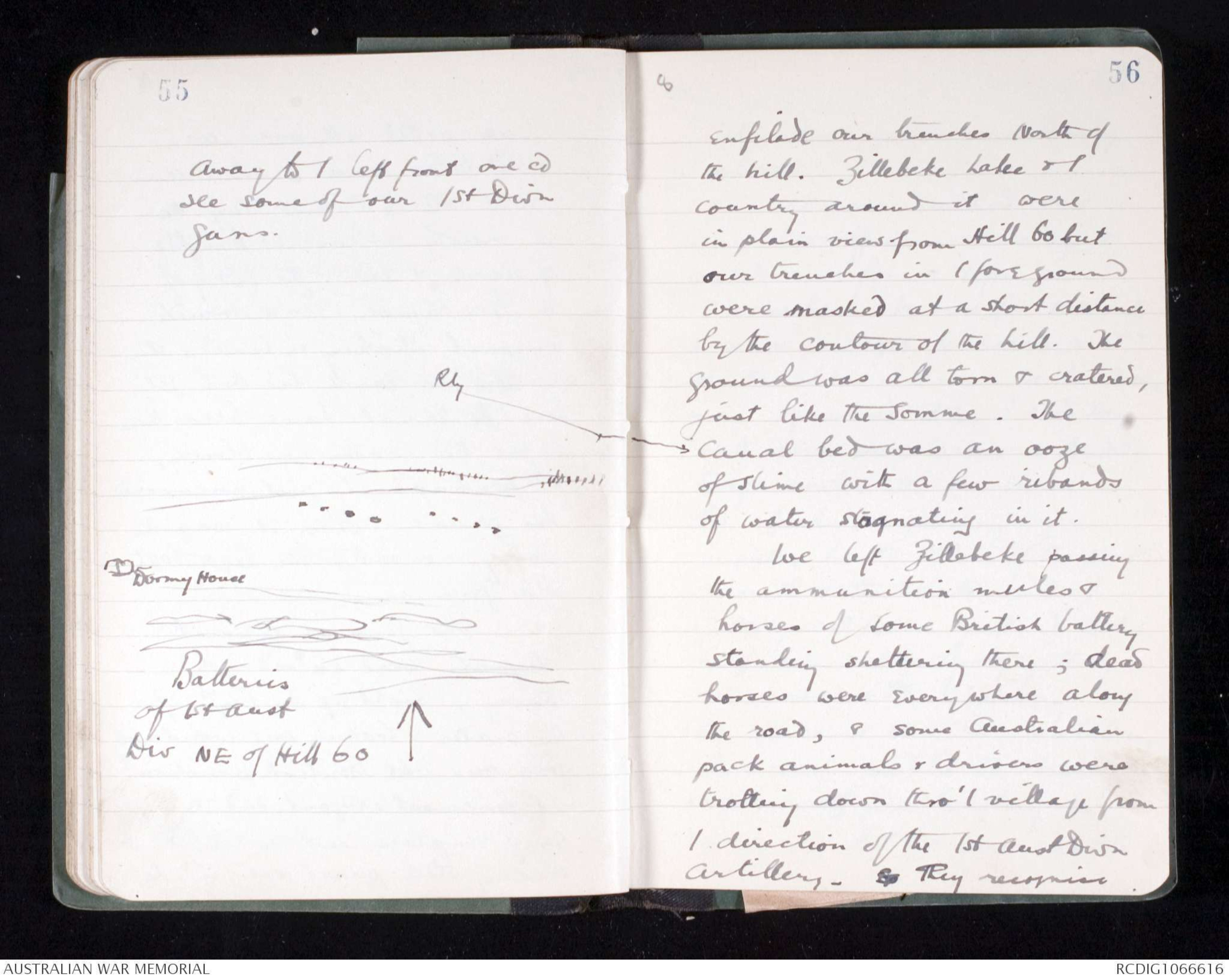
8
45
consciousness. He ws
pulled out by someone who
saw him, & left. He camehome & wandered back to
his unit later - covered w
mud. They say also tt
some British Artillery drivers
& their teams were hit at
Shrapnel Corner / other
day & pulled to / road side
& left there, apparently
for dead, / men under /
horses. Some Australian
artillery men, some days
afterwds, looked at them
& found so at least one
o / men alive & had him
taken to hospital. They
didn't know if he lived.
I can't guarantee /
details of either story;
but there is some truth
8
46
certainly at / bottom of
both.
Gullett arrived tonight.
Aug 16. Went out with
Gullett to the 3rd Divn,
Thence to Kemmel to see
if there ws anything to be seen
of the Second Great Phase
of the Flanders Battle, wh
started at dawn today.
We went on to Cassel
where Gullett met again
Gibbs & some of his old
friends - Faunthorpe & Gibbs
are really great friends of
his.
The Germans put 8 shells into
Hazebrouck today— 4 abt lunch, 4 later.
No casualties tho they smashed a house or two
Aug. 17 - I was to go &
meet the two new photographers.
But as they didnt turn cdnt get their
8
47
gear ready in London till
Tuesday, we went up to
see our artillery instead.
Gullett ws very keen to do
this - he is an artillery man.
Dyson, G. & myself went
We drove through
Dickebusch, north of
Shrapnel Corner & along
/ newly made duckboard
track north o / ^Zillebeke lake past Zillebe to near
Zillebeke - Then got out
& walked (the 4th F.A. Bde sent
us a guide) past Zillebeke
Near Dormy House_
where they were shelling
with 5.9s & sent two
unpleasantly near to us -
to the 15th Bty. Maj. Manton
ws there, looking a bit worn
Brit back in [[shorthand]]Lens. attitude of M re
Popes peace.British [[shorthand]]
Aug. 18.
Gullett 14 Bde
Germans drop bombs
on Gendarmerie
Aug. 19
Gullett 3rd O 2 Bde
Germs over agn.
Rly Strike in Engld.
Aug 20. To Boulogne.
Record Photos.
Unit History.
8
49
The Germans are shelling
the whole area irregularly;
& they got one shell into his
trench (an old British
front line Trench abt 300yds
N. of Hill 60) a few days ago
& killed or wd. 15 men in
one explosion. He has lost
35 men - & has come off
fairly well. (The average
loss for ^all field arty, White tells
me, first & last, all thro'
this fight, is abt 50 per cent
Hand drawn diagram – see original
8
50
The 15th Bty had no deep dugouts,
only the old "elephant iron" half
circular roofed ones, dur inset
into / side o / trench. Manton,
who ws in / middle of shaving,
looked a bit tired, & worn. Like
all these good fellows he immediately
sent off for some tea for us.
They had only been called up for
one or two S.O.S. signals since
yesterdays attack, he told me; but
then in their part / advance ws
only a bit of a feint. Of all the
men he said the palm goes, in
this show, to the drivers. It ws
almost looked on as a "cold footed"
job before - one wh did not take
a man into action. But the
drivers had come straight into it in
this battle; &, like all ^those Australians
who were supposed to be in fairly
8
51
safe jobs, they took a sort of pride
in showing what they could do
when they became combatants or
came into the thick of / fight. Every
day & night - night especially -
up they had to come thro' the
barrage - thro the dark & the awful
mud - & the way they came through
& the way Manton spoke of them
made them ^clearly the heroes of the cablewhich describing this stage of / battle.
As Hill 60 ws so close Gullett
& I went up to see it while
Dyson sketched. [There ws a sort
of general pounding going on all
the time with 5.9s, within a
one battery sending 4 shells
every few minutes somewhere
within 500 yards or so - & others
similarly abt / horizon landscape.
In front was the ^red brown series of
crests - XX with the scratchy close
It ws really the railway!
C.E.W.B.
14.7.31
8
52
clipped ^grey tree trunks - the skel
broken skeletons of old woods -
where the British line used to
run - Mount Sorel & so on
- Shrewsbury Forest cd be seen
from one point.
Hill 60 was a mound
on the horizon to our right -
a scarcely perceptible rise,
(thro wh the canal ran we
found, when we got there)
marked by the flat dump
which means the edge of a
big mine crater. Our men
were strolling all over /place. country around, on
various work. On Hill 60
we found a couple of concrete
blockhouse dugout entrances;
& by one of them, fair in / open,
ws sitting Maj. Sinclair & his
8
53xxxxx telephonists, observing.
They were shooting at some
place called "The Cottages" visible
on the horizon just over / red ridge.
But what was illuminating
ws the view wh Hill 60 gave
you over / German back country
behind Messines. No wonder
they fought for it like tigers.
The white chateau down on the
flats, hedges, trees, villages,
houses for miles over /
country were all spread out
before it
The hill was torn & pitted
w mine craters like no other
place tt I have ever seen.
Great long runnels of themwith fo where two or three must
have exploded together, with
stagnant foul pools in / bottom
of them. The big crater at / top
8
54
was pitted all over w
shell holes since made. And
on / side of it there lay the
a newly uncovered bundle
of black & red - the body of
a Frenchman - w a French
bayonet sticking in beside it.
No how on Earth did that get
here? He must have been there
long before the crater ws blown,
& perhaps it just uncovered
his grave. Near it was the
body - or rather the leg & boot-
of a German.
The German concrete
dugouts were exceedingly
strong, right up on / top of
the crater & looking out wonderfully
over our old British position.
The foremost dugout had a
m.g. emplacement with a
sliding steel panel over it, to
55
Away to / left front one cd
see some of our 1st Divn
guns.
Hand drawn diagram – see original
8
56
enfilade our trenches North of
the hill. Zillebeke Lake & /
country around it were
in plain view from Hill 60 but
our trenches in / foreground
were masked at a short distance
by the contour of the hill. The
ground was all torn & cratered,
just like the Somme. The
[*Rly*] Canal bed was an ooze
of slime with a few ribands
of water stagnating in it.
We left Zillebeke passing
the ammunition mules &
horses of some British battery
standing sheltering there; dead
horses were everywhere along
the road, & some Australian
pack animals & drivers were
trotting down thro' / village from
/ direction of the 1st Aust Divn
Artillery_ So They recognise
 Deb Parkinson
Deb ParkinsonThis transcription item is now locked to you for editing. To release the lock either Save your changes or Cancel.
This lock will be automatically released after 60 minutes of inactivity.